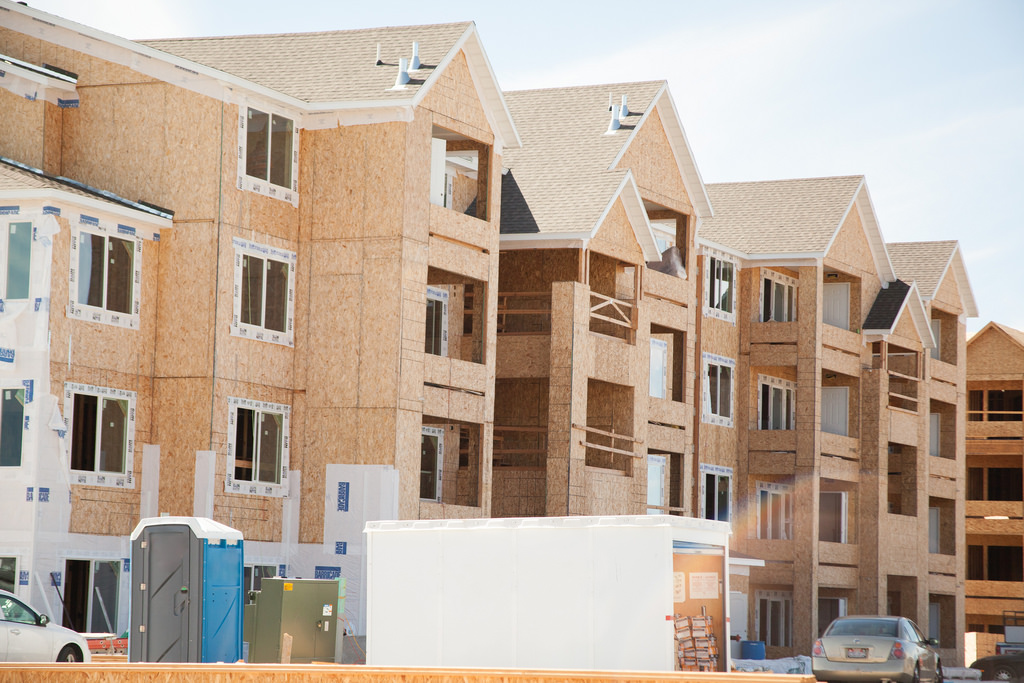Predictions that multifamily housing construction would taper off in 2015 may have underestimated the ongoing demand for this kind of housing, the vast majority of which is being marketed as rentals.
Seasonally adjusted annualized starts for structures with five or more units rose to 476,000 in June, an 18-year high, according to Commerce Department estimates released a few days ago. That number was 28.6% higher than the annualized multifamily starts rate in May, and 55% higher than the comparable number in June 2014.
Perhaps more significant is the fact that multifamily continues to propel most of the housing sector’s current growth. While annualized single-family starts in June, at 685,000 units, were 14.7% ahead of June 2014, they actually declined by 0.9% compared to May 2015.
“The multifamily gains this month are encouraging and show that the millennial generation continues to be drawn to the rental market,” said Tom Woods, a home builder from Blue Springs, Mo., who is chairman of the National Home Builders Association (NAHB).
All told, the year-over-year annualized rate for all starts was up 26.6% in June to 1,174,000 units.
The NAHB/Wells Fargo Housing Market Index, which tracks Builder Confidence levels, hit 60 in July. The Index also revised its June level to 60. The last time this Index got this high was November 2005.
If permit activity is a gauge of future optimism about demand, builders remain solidly behind multifamily. The annualized rate in June for permits issued for structures five or more units was up 79% to 621,000 units, compared to June 2014. Single-family permits, on the other hand, were up 6% to 687,000, according to Commerce’s estimates. All told, annualized new-home building permits jumped 30% to 1,343,000.
The latest annualized data show that 500,000 structures with five or more units were under construction in June, 20.5% more than in June 2014; and 317,000 units were completed, a 17.9% gain.
David Crowe, NAHB’s chief economist, noted that while the starts and Builder Confidence numbers were positive signs, he cautioned that builders “still face a number of challenges, including shortages of lots and labor.”
Related Stories
| Aug 11, 2010
CityCenter Takes Experience Design To New Heights
It's early June, in Las Vegas, which means it's very hot, and I am coming to the end of a hardhat tour of the $9.2 billion CityCenter development, a tour that began in the air-conditioned comfort of the project's immense sales center just off the famed Las Vegas Strip and ended on a rooftop overlooking the largest privately funded development in the U.
| Aug 11, 2010
Giants 300 Multifamily Report
Multifamily housing starts dropped to 100,000 in April—the lowest level in several decades—due to still-worsening conditions in the apartment market. Nonetheless, the April total is below trend, so starts will move progressively back to a still-depressed 150,000-unit pace by late next year.
| Aug 11, 2010
The softer side of Sears
Built in 1928 as a shining Art Deco beacon for the upper Midwest, the Sears building in Minneapolis—with its 16-story central tower, department store, catalog center, and warehouse—served customers throughout the Twin Cities area for more than 65 years. But as nearby neighborhoods deteriorated and the catalog operation was shut down, by 1994 the once-grand structure was reduced to ...
| Aug 11, 2010
Gold Award: Westin Book Cadillac Hotel & Condominiums Detroit, Mich.
“From eyesore to icon.” That's how Reconstruction Awards judge K. Nam Shiu so concisely described the restoration effort that turned the decimated Book Cadillac Hotel into a modern hotel and condo development. The tallest hotel in the world when it opened in 1924, the 32-story Renaissance Revival structure was revered as a jewel in the then-bustling Motor City.







